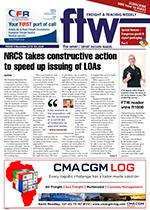The National Regulator for Compulsory Specifications is expected to present a firm proposal before the end of this month to the department of trade and industry to speed up the issuing of Letters of Authority (LOA) to importers.
Without these LOAs, which provide proof of compliance with SA standards, Customs will not release the goods to importers.
“A key element of the proposition – to be jointly agreed with the private sector and industry associations – will be the acceptance of a certificate of conformity that will be done both overseas and locally by approved conformity assessment bodies before the goods are despatched or put to market,” founder of the EU Chamber of Commerce and Industry in South Africa, Stefan Sakoschek, told FTW.
A nominal payment for the assessment will apply – but on acceptance of that certificate the LOA will be fast-tracked and will be available within five working days.
“This is an enormous step forward,” said Sakoschek, and comes on the back of a concerted drive by the organisation to implement its risk-based approach. “It’s what we have been working on for the past four years. In September 2016 the NRCS and the dti, in a submission to parliament, committed to a risk-based approach to the issuing of LOAs – and that included pre-shipment inspection.
“This approach has made some progress," said Sakoschek. “They have managed to soak up some of the backlog, but it’s building up again as the festive season approaches.” Mark Saunders of the SA Domestic Appliance Association (Sada) agrees that the organisation is moving in the right direction. “We have to give them a bit of credit for rolling out their risk-based approach. We haven’t seen the full effect yet but speaking to members of the association, it appears people are starting to see slight improvements. We’re by no means up to any global or gold standard but there signs of improvement.”
In terms of the mandate from the dti that LOAs will be issued within 120 days, Saunders said many were still not meeting the deadline. He told FTW that one of his LOAs was on 180 days. “They’re still struggling with resources and don’t have enough funding so the systems are not in place to facilitate their objectives,” said Sakoschek. “They want to see implementation by the second quarter of 2019 – and for that to happen they need to make rapid decisions now.”
There appears to be industry consensus that the right structure is in place at the organisation. The CEO Edward Mamadise has been confirmed after operating in an acting capacity for some time. Bongani Khanyile has been appointed to head up the modernisation process which is key to the risk-based approach. A lot of groundwork has been undertaken over the past few months and the next step will be to implement the outsourcing of some of the conformity assessment to private sector bodies. It is expected that two or three conformity assessment bodies (CABs) will be appointed and will be recognised by the NRCS.
“This means that exporters in the country of origin will be able to use one of those bodies to get a certificate of conformity (COC) which will be the basis for fasttracking the LOA. This will concurrently do away with the “golden sample” syndrome experienced to date by both NRCS (and SABS)," said Sakoschek “Fundamentally, and as it will be supporting and assisting the accuracy and completeness of the LOA applications “challenge”, the COC will be submitted to the NRCS together with the LOA application, which will in turn speed up the issuing of the LOA."
All applications will be considered on the basis of the risk-based programme – and the risk ranking will be based on the COC. “In other words, if a blue-chip company is compliant, and further participates – in effect, at a nominal cost in comparison to demurrage or loss of revenue – in what is essentially a “selfcompliance” scheme, they would immediately qualify as low risk." The up-to-now disappointing level of efficiency of the organisation has not however prevented it from applying for an increase in LOA costs and levies. A 6% increase was due to take effect on April 1, but wasn’t implemented, according to Saunders.
“It is currently with Treasury awaiting approval which I foresee as a mere formality – and charges will be retrospective to April 1 this year. “We have proposed that while their efficiency is what it is, and market surveillance is what it is, and relatively few compliance companies are paying the levy, it’s not fair to impose above-inflation increases to the rest of the industry – and this increase is considerably above inflation.” Saunders believes that seven days would be a reasonable issuing period.
“120 days makes it very difficult. It’s a long-winded process and puts enormous pressure on any kind of planning system in big multinationals. It also adds huge complexity to processes and means SA is behind the world standard. The result is that global launches can’t go ahead because South Africa is not ready – or sometimes South Africa is not part of a global launch when a new product comes onto the market.”
A key element of the proposition will be the acceptance of a certificate of conformity by approved bodies. – Stefan Sakoschek

